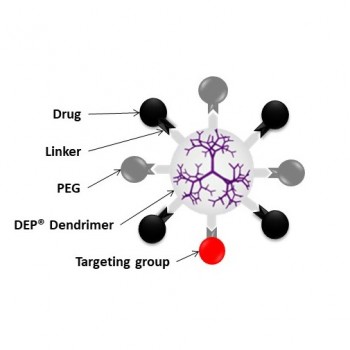Imagine anti-cancer therapies with fewer side effects and improved effectiveness. Starpharma is turning this dream into a reality, not just for cancer treatments but also for drugs to treat a range of diseases. It all stems from Starpharma's patented dendrimer nanoparticle drug delivery technology, which we refer to as ‘Dendrimer Enhanced Products’ or DEP® for short.
How does DEP® work?

Starpharma's DEP® technology involves using dendrimers, which are highly branched, tree-like molecules, to enhance the delivery of therapeutic agents such as drugs. Dendrimers have a well-defined structure with multiple functional groups that can be modified for various purposes, including drug delivery.
Starpharma uses its dendrimer technology to create proprietary, patented DEP® products by attaching therapeutic compounds to dendrimers. These DEP® dendrimers act as a versatile scaffold that can be tailored to carry a wide range of drug or radioactive payloads, control their activity, and target specific locations in the body, such as a tumour or a particular cell type.
By attaching therapeutic payloads (drugs or radioactive isotopes) to Starpharma’s dendrimers with functional linkers or chelators, it is possible to customise and control the payload’s activity and minimise toxicity, including regulating where, when, and how quickly a payload is released in the body. This versatility allows very precise design and control of payload delivery, ensuring it is released in the right location, at the right time, and at the right pace.
The specific mechanisms by which DEP® enhances drug delivery can vary based on the drug and the application. It could involve improved drug solubility, prolonged circulation time in the bloodstream, targeted delivery to specific cells or tissues, or a combination of all these features.
Dendrimers for drug delivery
Starpharma's DEP® drug delivery platform aims to enhance the effectiveness of existing and novel therapies, including chemotherapeutic agents, radiotheranostics, and Antibody-Drug Conjugates (ADCs), while reducing drug-related toxicities through controlled and specified drug delivery. DEP® has already been widely applied in oncology but can also be applied to other classes of drugs.
DEP® allows for more controlled and precise drug delivery, which provides therapeutic and commercial opportunities. DEP® allows for the creation of new intellectual property and extends the patent life of existing drugs. DEP® is versatile and can be applied to a wide range of therapeutic modalities, including small molecules, peptides, proteins, and nucleic acids such as mRNA. Because of this versatility, DEP® is often referred to as a platform drug delivery technology.
DEP® Development Pipeline
Starpharma has developed a pipeline of novel DEP® oncology products. Its clinical-stage assets, DEP® cabazitaxel, DEP® docetaxel, and DEP® irinotecan, are dendrimer versions of widely used chemotherapeutic drugs that have demonstrated improvements in efficacy and tolerability in Phase 2 clinical trials. Additionally, Starpharma has a preclinical pipeline of DEP® radiopharmaceuticals and DEP® Antibody-Drug Conjugates (ADCs) in development.
Benefits of DEP®
Starpharma's DEP® platform is a dendrimer-based proprietary drug delivery technology that enhances the efficacy, safety, and/or targeted delivery of various pharmaceutical compounds. DEP® creates significant optionality and has the potential to improve the treatment of various diseases, particularly cancer, by optimising drug delivery and distribution and enabling targeted therapy.
The DEP® technology is highly versatile and flexible in drug formulation, enabling Starpharma to target a wide range of therapeutics, including small molecules, peptides, proteins, and nucleic acids. It also offers more opportunities for combination therapies and targeting broader cancer indications.
The potential therapeutic and commercial benefits include:
- improving efficacy
- improving bioavailability
- reducing toxic side effects
- extending the duration of activity of the drug in the body
- targeting drugs to organs, tissues or molecular receptors
- increasing solubility
DEP® Partnering Opportunities
Starpharma’s DEP® platform is an innovative dendrimer-based drug delivery system that has the potential to enhance both the therapeutic and commercial value of a wide range of pharmaceuticals, making it a highly valuable partnering technology. The DEP® platform holds significant optionality and immense potential to improve the treatment of various diseases, particularly cancer, by optimising drug properties and enabling targeted therapy.
Partners can access this novel drug delivery platform through research collaboration or licensing opportunities, which can provide significant leverage and optionality.
The DEP® platform presents various collaboration and licensing opportunities for developing innovative therapies in different areas, such as novel chemotherapeutics, combination approaches with immuno-oncology agents, antibody-drug conjugates (ADCs), radiopharmaceuticals, radiodiagnostics and antivirals.
Starpharma is actively seeking partners to combine their molecules/compounds of interest with our DEP® technology to develop new proprietary therapies.
Partner with us
Contact our business development team to explore partnership opportunities with Starpharma.
Business Development
T: +61 3 8532 2700
E: busdev@starpharma.com